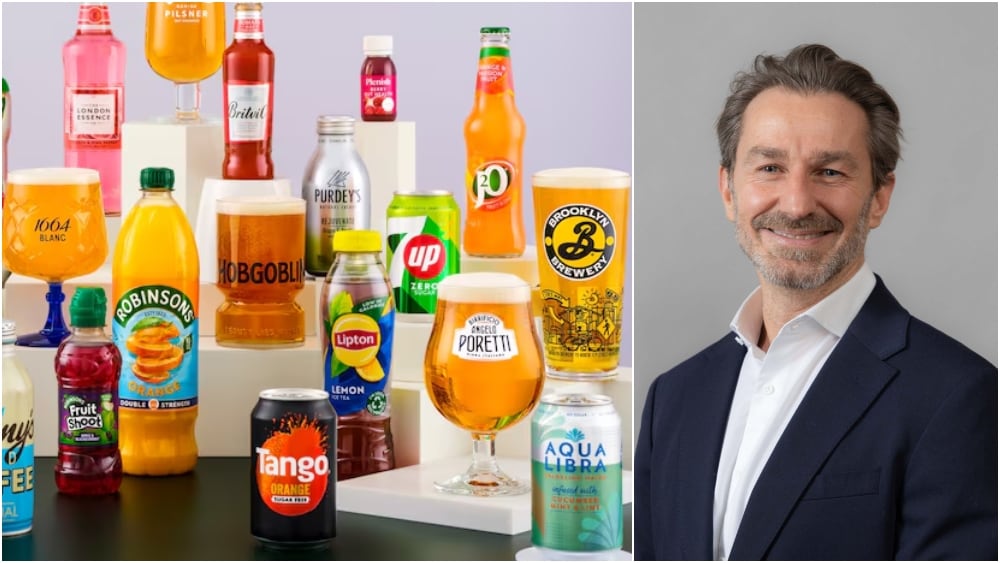The former vice-president off-trade sales & e-commerce at Carlsberg Marston’s Brewing Company reveals how he de-stresses.
“Work life balance is very important to me,” Pratt begins. “I am not someone who will work 24/7.
“I believe you work the hours you need to get the work done and protect the downtime. My partner, Michelle, works away a lot, and this means the weekends we have together are really precious to us.”
He adds their two dogs, Alfie and Louis, are his world and bring him happiness and joy, even on the longest days.
He continues: “Family help out looking after the dogs when we are both busy, but I try to make the time every day to get out with the dogs for a walk in nature because this is a bit of time to de-stress and get some exercise.
“I also spend lots of time in the garden and try to go surfing whenever I can because it’s something I love.”
Exercise is important to Pratt, who does so to keep a healthy mind and body.
He has a passion for surfing and take regular trips to Sri Lanka, which he says is his “spiritual home” or he will head to the wave pool in Bristol at weekends.
“As a passionate gardener, I spend a lot of time either maintaining, planting or growing my own veg. And of course, a lot of time walking the dogs in the Cotswolds countryside,” he says.
Time management
Time is the biggest challenge in his work, whether that is time spent in meetings or time spent travelling.
He explains: “Being able to manage time is absolutely critical, particularly where delivering performance is a constant pressure.”
Pratt, who began his at Carlsberg as customer planning director in 2016, adds: “There is a lot of responsibility on your shoulders as a senior leader.
“The transition from being a functional leader to a business leader and having input across all functions was a big change. You are no longer the expert at that level, your team is, and that takes some getting used to.”
If he were to start from scratch again, his sage advice would be to slow down and recognise you can’t change everything, and to be successful, one must learn to prioritise and make choices.
Does he have any regrets? He answers: “No. I believe you learn from every experience, whether it’s good or bad.
“You need to keep looking forwards, not backwards. We are all human and we all make mistakes, it’s not an issue if we do, we learn from it and move on.”
When it comes to highest and lowest points of his career, he says: “In April 2019, I was appointed to the management team at Carlsberg UK. This was an internal promotion and a significant step up for me.
“I had shown I had talent and skill but didn’t have prior experience at that level. I was encouraged to apply for the role and the rest is history.”
Building high-performing teams
He expresses thanks to former Carlsberg UK CEO Tomas Blawat, who showed faith in him.
He adds there are many others who, throughout his career, have supported my progression on to senior leadership and states: “The step up in 2019 allowed me to really focus on building high-performing teams and driving change, which I’ve managed successfully through several joint ventures and acquisitions.”
The low points include being uncertain on where his career was going and wasn’t clear on what steps he needed to take.
“There have also been periods earlier in my career where I have worked with poor leaders and had to manage without the direction and certainty that leaders should provide,” he says.
“Those experiences are all opportunities to learn. I discovered that, by taking your time and working through the challenges, something will always come along.
“My experiences have helped shape me as a leader and made it clear to me from an early stage how you should treat and value the teams you manage.
“Being a leader isn’t always easy – you are responsible for some tough decisions, but in every circumstance, you should always treat people fairly and respectfully.”
Success is down to dad
Family continues to be a theme and Pratt acknowledges his late father.
He explains: “A lot of what has shaped me is down to my upbringing and my father. He was a great role model and teacher, and I learnt a lot from him.
“I feel proud of my achievements and a lot of that success is down to my father and the advice and the support he gave me. I lost my father a few years back and I am always grateful that he got to see me having a successful career and that I was able to tell him this, and I know he would be proud of me.”
Indeed, passing knowledge and help down the line is something Pratt does.
His advice is: “Be patient and take risks. Do differentiated roles to broaden your experience because this will pay off in the future.
“It takes time to build experience and sound judgement based on experiencing different situations. It will be worth it in the long run but you do need to be patient.”
The possibility of loneliness in a position of leadership is something Pratt comments upon.
“There will be times when you are working on confidential projects and that can be lonely,” he states. “It is important to have a strong team around you, and colleagues you can talk to and have fun with.
“I am fortunate to have a great manager who is very understanding with similar values, who I can talk to. We can also have a laugh together, so even on the days when it is tough, I always end up with a smile after a conversation with my manager.”
Seek out data-driven insight
He has further advice and focuses on data being an “amazing tool”.
Pratt says: “There is a lot of insight to be gained that can support businesses in their growth ambitions. I would encourage others to seek out the data-driven insight and advice that established suppliers can offer.
“There’s so much practical application to be had, whether that’s on understanding trends, making menu decisions, recipe inspiration, choosing PoS materials, understanding legislation changes and much more.
“It is important to think about your range and ensuring you are keeping the latest key trends in mind, focusing on consumer needs and occasions.
“For example, low & no continues to show really strong category growth, particularly among a younger demographic. Likewise, non-alcoholic cocktails have seen impressive growth since 2022, doubling penetration from 3% to 6%.
“It’s also important to appeal to a wide audience and look for new opportunities to cater to consumers. While dinner remains the most popular mealtime visit, 57% of consumers will visit a pub or bar for lunch so operators should be thinking about how to capitalise on those daytime dining opportunities.”
Finally, Pratt explains excellent leadership is giving people clarity of direction even when dealing in grey areas, so they know what is expected of them and why – adding the top qualities a leader should have are to be decisive, empathetic and authentic; and to be a strong communicator.
He adds: “It is essential for a successful leader to be clear on their purpose and vision, and how they plan to get there as a team. That can mean having difficult conversations. There are times you must make difficult decisions as a leader, and you have to be comfortable doing this.”





